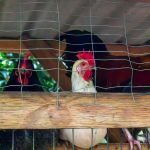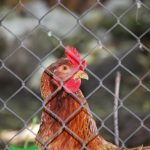Chickens, like all animals, have specific needs that must be met in order for them to thrive, especially during the winter months. Understanding these needs is crucial for ensuring the health and well-being of your flock. In winter, chickens require a warm and dry environment to protect them from the cold and damp conditions. They also need access to fresh water and nutritious food to maintain their energy levels and stay healthy. Additionally, chickens need proper ventilation in their coop to prevent the buildup of moisture and ammonia, which can lead to respiratory issues. It’s important to be aware of these needs and take the necessary steps to provide for them in order to keep your chickens happy and healthy during the winter.
Chickens are particularly susceptible to cold temperatures, as they lack the ability to regulate their body temperature in the same way that mammals do. This means that they rely on their environment to provide them with the warmth they need to stay comfortable and healthy. In winter, it’s important to ensure that your chickens have a well-insulated coop that protects them from the cold and drafts. Additionally, proper ventilation is essential to prevent the buildup of moisture and ammonia, which can lead to respiratory issues. Providing your chickens with a warm and dry environment, as well as access to fresh water and nutritious food, is crucial for their well-being during the winter months.
Table of Contents
Providing Proper Insulation and Ventilation in the Coop
Proper insulation and ventilation are key components of creating a comfortable and healthy environment for chickens in winter. Insulation helps to retain heat and keep the coop warm, while ventilation helps to remove moisture and ammonia from the air, preventing respiratory issues. When insulating a chicken coop, it’s important to use materials that are safe for chickens, such as straw or wood shavings. Additionally, it’s important to ensure that the coop is well-ventilated, with windows or vents that can be opened or closed as needed to regulate airflow. By providing proper insulation and ventilation in the coop, you can help to keep your chickens warm and dry, while also preventing respiratory issues that can arise from poor air quality.
In addition to insulation and ventilation, it’s important to consider the layout and design of the coop when preparing it for winter. The coop should be positioned in a location that is sheltered from strong winds and has good drainage to prevent water from pooling around the coop. Additionally, it’s important to ensure that the coop is well-sealed to prevent drafts and leaks. By taking these steps, you can create a comfortable and healthy environment for your chickens during the winter months.
Using Heat Lamps and Heated Waterers
In some cases, providing additional heat may be necessary to keep chickens warm during the winter months. Heat lamps can be used to provide supplemental warmth in the coop, especially during particularly cold spells. When using heat lamps, it’s important to ensure that they are securely mounted and positioned away from flammable materials to prevent fires. Additionally, it’s important to monitor the temperature in the coop regularly to ensure that it remains at a comfortable level for the chickens.
Another important consideration for winter is providing heated waterers for your chickens. It’s crucial for chickens to have access to fresh water at all times, even in cold weather. Heated waterers can help prevent water from freezing, ensuring that your chickens stay hydrated throughout the winter. By using heat lamps and heated waterers, you can help to keep your chickens warm and comfortable during the colder months.
Offering Warm Bedding and Roosting Bars
In addition to providing a warm and dry environment in the coop, it’s important to offer warm bedding for your chickens during the winter months. Straw or wood shavings can be used as bedding material, providing insulation and comfort for your flock. It’s important to regularly clean and replace bedding to prevent moisture buildup and maintain a healthy environment for your chickens.
Roosting bars are also essential for chickens in winter, as they provide a place for them to perch off the ground and stay warm. Roosting bars should be positioned higher than the nesting boxes, as chickens prefer to roost at higher elevations. Additionally, it’s important to ensure that roosting bars are wide enough for chickens to comfortably grip with their feet, preventing frostbite on their toes. By offering warm bedding and roosting bars, you can help to keep your chickens comfortable and healthy during the winter months.
Providing Nutritious Food and Fresh Water
During the winter months, it’s important to provide your chickens with nutritious food and fresh water to help them maintain their energy levels and stay healthy. Chickens require a balanced diet that includes protein, carbohydrates, vitamins, and minerals to support their overall health and well-being. It’s important to offer a high-quality feed that is specifically formulated for laying hens or broilers, depending on the type of chickens you have. Additionally, offering treats such as mealworms or scratch grains can help provide extra energy for your flock during the colder months.
Fresh water is also crucial for chickens in winter, as they need access to water at all times to stay hydrated. Heated waterers can help prevent water from freezing, ensuring that your chickens have access to fresh water throughout the winter. It’s important to regularly check waterers for ice buildup and refill them as needed to ensure that your flock stays hydrated.
Implementing Regular Health Checks and Monitoring
Regular health checks are essential for ensuring the well-being of your chickens during the winter months. It’s important to monitor your flock for signs of illness or injury, such as lethargy, decreased appetite, or abnormal behavior. Additionally, it’s important to regularly check for signs of frostbite on your chickens’ combs, wattles, and toes, as well as signs of respiratory issues such as coughing or sneezing.
In addition to regular health checks, it’s important to monitor the temperature and humidity levels in the coop to ensure that they remain at a comfortable level for your flock. It’s also important to monitor waterers for ice buildup and refill them as needed to ensure that your chickens have access to fresh water at all times. By implementing regular health checks and monitoring, you can help ensure that your flock stays healthy and happy throughout the winter months.
Creating Enrichment Activities for Chickens in Winter
Enrichment activities are important for keeping chickens mentally stimulated and engaged during the winter months when they may spend more time indoors. Providing enrichment activities can help prevent boredom and reduce stress in your flock. Some enrichment activities for chickens include hanging treats such as cabbage or lettuce from a string for them to peck at, providing perches or platforms for them to explore, or offering toys such as mirrors or balls for them to interact with.
Additionally, allowing your chickens access to an outdoor run or fenced area on milder days can provide them with opportunities for natural behaviors such as scratching, dust bathing, and foraging. It’s important to ensure that outdoor areas are safe from predators and have adequate shelter from wind and rain. By creating enrichment activities for your chickens in winter, you can help keep them mentally stimulated and happy during the colder months.
In conclusion, understanding the needs of chickens in winter is crucial for ensuring their health and well-being during the colder months. By providing proper insulation and ventilation in the coop, using heat lamps and heated waterers when necessary, offering warm bedding and roosting bars, providing nutritious food and fresh water, implementing regular health checks and monitoring, and creating enrichment activities for your flock, you can help keep your chickens happy and healthy throughout the winter months. Taking these steps will not only ensure the well-being of your flock but also provide you with peace of mind knowing that you are doing everything you can to care for your chickens during the colder months.
Meet Walter, the feathered-friend fanatic of Florida! Nestled in the sunshine state, Walter struts through life with his feathered companions, clucking his way to happiness. With a coop that’s fancier than a five-star hotel, he’s the Don Juan of the chicken world. When he’s not teaching his hens to do the cha-cha, you’ll find him in a heated debate with his prized rooster, Sir Clucks-a-Lot. Walter’s poultry passion is no yolk; he’s the sunny-side-up guy you never knew you needed in your flock of friends!







